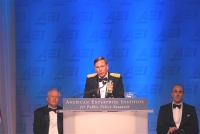WASHINGTON, May 7, 2010 — The Army’s conversion to a modular combat brigade structure in the years immediately preceding the surge of forces into Iraq was a key factor in the strategy’s success, the commander of U.S. Central Command said here yesterday.
“As I have noted on several occasions, the most important surge in Iraq was not the surge of forces,” Army Gen. David H. Petraeus said in a keynote address to the American Enterprise Institute for Public Policy Research. “Rather, it was the surge of ideas that guided the employment of our forces in Iraq.”
Petraeus – who commanded U.S. forces in Iraq during the surge – received the Irving Kristol Award at the institute’s annual dinner and gala.
The general recounted the events and processes that led to the Army’s transformation from a division-centric to brigade-centric fighting force, noting that the modular-brigade concept changed the way forces deployed to Iraq and Afghanistan.
Transformation is a part of the Army’s recent history that’s “near and dear” to his heart, Petraeus said. The period from 2005 to 2006, when brigade combat teams were equipped and manned to function more independently, he said, doesn’t receive the credit it deserves for the Army’s success in Iraq and progress in Afghanistan.
The surge proved critical to progress in Iraq, Petraeus said, however, he noted that the Army’s period of transformation pre-dated the surge. “Indeed, it was during this period that we developed the intellectual underpinning that proved so critical when additional forces were deployed to Iraq in 2007,” he said.
Without those ideas and new thinking about counterinsurgency operations, U.S. forces would not have been successful in the surge, Petraeus said. The efforts that institutionalized those ideas “touched all aspects of our Army” through a generational transformation, he added.
Much has changed in the way the Army operates on and off the battlefield, the general said, including doctrine, the way leaders are educated, how forces are trained, and how the Army builds on lessons learned. He also noted the Army’s shift from division rehearsal exercises prior to deployments to three-week tours by brigade combat teams to joint readiness training centers in California, Louisiana or Germany.
The Army worked tirelessly to provide realistic training for troops to prepare deploying units for the constantly evolving insurgent threats, he said.
All of the Army’s changes have “had far-reaching implications for the conduct in our operations in Iraq, and most recently, in Afghanistan,” the general said.
Petraeus also recognized servicemembers and military leaders for their commitment in putting those ideas into practice. He recalled how the coalition was struggling in Iraq in 2004. Despite some progress at that time, the insurgency still spread, and by 2006, sectarian violence began to grow at an alarming rate. Political progress in Iraq then was at a virtual standstill, he said.
When the surge of forces arrived in 2007, troops focused on securing the population by living near the communities in combat outposts, rather than commuting to the fight from larger bases, he said. Troops fostered reconciliation when possible, relentlessly pursued al-Qaida and supported civil-military efforts.
The increased number of troops and their training enabled success, he said. And although the mission in Iraq “got harder before it got easier,” the general added, coalition and Iraqi forces were able to reduce violence by more than 90 percent. Improved security allowed for infrastructure repairs, revival of the economy and the process of Iraqi elections – “all of which gave rise to new hope,” he said.
“This hope was created as a result of the changes our Army, together with the other services, made in 2006 that enabled the subsequent implementation of our big ideas in Iraq in 2007,” he said. “This was the process that enabled the real surge in Iraq – the surge of ideas. Armed with and trained on these ideas, leaders and troopers who got it about counterinsurgency deployed to Iraq and enabled the progress we’ve seen there over the past three years.”
War calls for constant learning and adaption, especially in a counterinsurgency fight, Petraeus said. But military leaders and servicemembers still have much to learn, he acknowledged.
“The side that learns and adapts the fastest often prevails,” he said.
Source:
U.S. Department of Defense
Office of the Assistant Secretary of Defense (Public Affairs)

 von
von 